

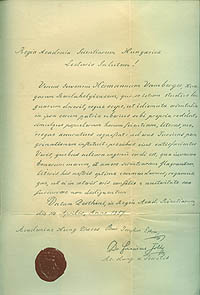 Before
leaving for Turkey, his letter of recommendation issued on behalf of the
scholarly body was signed on 14 April 1857 by Baron József Eötvös and the then
secretary of the Academy Ferenc Toldy. In the next year, at each June session
they had readings from “Vámbéry’s extracts from Hodja Saduddin Effendi’s Tadj
üt tevarich (The crown of histories) on the Turkish campaigns of John
Hunyadi”. In 1859 Mór Ballagi held a reading of Vámbéry’s comparison of
the Chagatai and Hungarian languages, and submitted to the Academy the
manuscript of Vámbéry’s Chagatai-Turkish-Hungarian comparative dictionary.
1
Before
leaving for Turkey, his letter of recommendation issued on behalf of the
scholarly body was signed on 14 April 1857 by Baron József Eötvös and the then
secretary of the Academy Ferenc Toldy. In the next year, at each June session
they had readings from “Vámbéry’s extracts from Hodja Saduddin Effendi’s Tadj
üt tevarich (The crown of histories) on the Turkish campaigns of John
Hunyadi”. In 1859 Mór Ballagi held a reading of Vámbéry’s comparison of
the Chagatai and Hungarian languages, and submitted to the Academy the
manuscript of Vámbéry’s Chagatai-Turkish-Hungarian comparative dictionary.
1
Before his Central Asian journey, which he began with the financial support of
the Academy, he said farewell to his fellow members on 29 July 1861. In his
speech he explained what led him to study Eastern languages, with a special
focus on Turkic languages. He set the purpose of his actual journey like this:
“instead of a more beautiful and more romantic ancient Hungarian homeland, we
are looking for the linguistic truth.”
2
After returning home, he regularly held readings at the Academy.Between 1867 and
1899 he read 26 times his own treatises, and several other times the works of
young researchers and scholars who were not members of the Academy. This is how
the writings of the young Ignác Goldziher, Károly Pozdner, Gábor Bálint, József
Thury were first heard in the new palace of the Academy. His presentations were
most attended in the years of the “Ugro-Turkish war” in the
palace along the Danube.
From his election until his death he tried to serve the cause of the Academy in
all respects, whether by personal work or by using his relationships.
When an “expeditio” was launched to Istanbul to explore the Corvina
codexes, brought there from the Buda castle of King Matthias Corvinus after the
Ottoman conquest in 1541, they also needed a specialist of Oriental languages.
Therefore, in the letter written to the Minister of Education, the Academy
suggested to include in the academic committee composed by Arnold Ipolyi, Ferenc
Toldy, Iván Télfy and Ferenc Pulszky also Ármin Vámbéry. In 1889, when Vilmos
Frakói read his “First report on the operation of the Constantinople
Committee”, he proposed that the Academy vote to say thanks to the
regular member Ármin Vámbéry, “who with the gravity of his prestige and tireless
fervor was a major factor of the hitherto achieved and still expected success.”
3
In June of the same year Ferenc Pulszky presented the so-called Rannusius Codex,
which was brought by Vámbéry from Constantinople, and deposed in the Library of
the Academy as a gift from the Sultan. Vámbéry personally made a report for the
Historical Committee on his research conducted in the Ottoman imperial state
archives, which provided new knowledge on the conditions of the Ottoman rule in
Hungary (1541-1686).
His academic career was unbroken. On 9 October 1860 he was elected corresponding
member. He held his inaugural speech entitled On the Turkish historical
literature on 29 April and 6 May 1861. In 1876 – after an unusually long
time – the 1st Class of the Academy appointed Ármin Vámbéry a regular member,
“who won a European fame with his works”. He was elected with 28 against 11
votes. He held his inaugural speech on 15 January 1877 with the title On the
etymological dictionary of the Turco-Tatar languages. In 1893 he was awarded
the honorary membership without negative vote, and in the next year he was
elected between the members of the board of directors. Nominated by the Academy, he
was a regular member of the international Orientalist congresses. On the meeting
of Florence (1878) he prepared the report for the Academy. Among the standing
committees of the Academy, he was a member from 1868 until his death of the
Linguistic Committee.
He presented several recommendation of memberships. He recommended Count Géza
Kuun
4 for honorary member, Károly Pozder for corresponding member, the
English playwright Henry A. Jones, who studied Hungarian folk tales and legends,
and the Turkish Minister of Public Education Mehmed Tahir Munif Pasha (1830-1910),
who “strongly supports our efforts around the Corvinas”, for external members.
In the case of both the archaeologist-explorer
Aurel Stein and the Iranologist
Sándor Kégl he gave one of the required two recommendations.
From the academic awards he received the Samuel Prize in 1869 with his
treatise Word correspondences in the Hungarian and Turco-Tatar languages.
The publication of his The first sources of Uyghur language was supported
by the Academy with 700 forints. The second edition of his The origin of the
Hungarians (1882) was published by the Publishing Committee of the Hungarian
Academy of Sciences, just like his The Turkish race in ethnologic and
ethnographic aspect (1885) and The culture of the West in the East (1906).
By the decision of the general meeting of the Academy on 3 October 1910, he was
greeted in writing on the 50th anniversary of his membership, and on 19 March
1912, his eightieth birthday the Secretary General and his fellow members
visited him with his greetings. “Vámbéry returned the greetings with the
expression of his warm and faithful affection, which he never ceased to attest
and proclaim toward the Academy by his deeds and scientific work”, is recorded
in the minutes composed on the occasion.
5
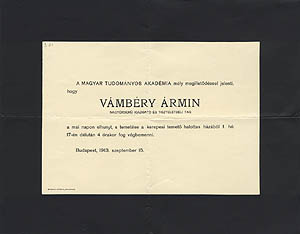 When
he died on 13 September 1913, the Secretary General of the Academy remembered
the former member of the board of directors like this: “he was one of the
boldest and most fortunate discoverers of the past century, who won great fame
and glory to our land by his numerous works in the field of geography,
ethnography and the ancient Turkic languages.”
6
When
he died on 13 September 1913, the Secretary General of the Academy remembered
the former member of the board of directors like this: “he was one of the
boldest and most fortunate discoverers of the past century, who won great fame
and glory to our land by his numerous works in the field of geography,
ethnography and the ancient Turkic languages.”
6
On 17 September, the Academy participated in his memorial service. The 1st Class
asked Ignác Goldziher to hold the speech of commemoration, who read it at the
general meeting of 25 October 1915.
7
In this he did not evaluate in detail Vámbéry’s scientific achievements,
8
since this was already done by Bernát Munkácsi in the Budapesti Szemle,
published on the commission of the Hungarian Academy of Sciences. Albert Berzeviczy,
the President of the Academy remembered the 100th birthday of Ármin Vámbéry on
the general meeting of 21 March 1932,
9 emphasizing that in Vámbéry we have to respect not only the founder
of Oriental studies in Hungary, but also the excellent writer who was able to
make them popular and beloved.
Lectures by and about Ármin Vámbéry in the Akadémiai Értesítő:
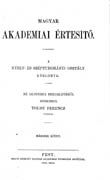 |
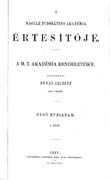 |
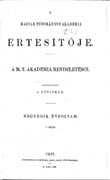 |
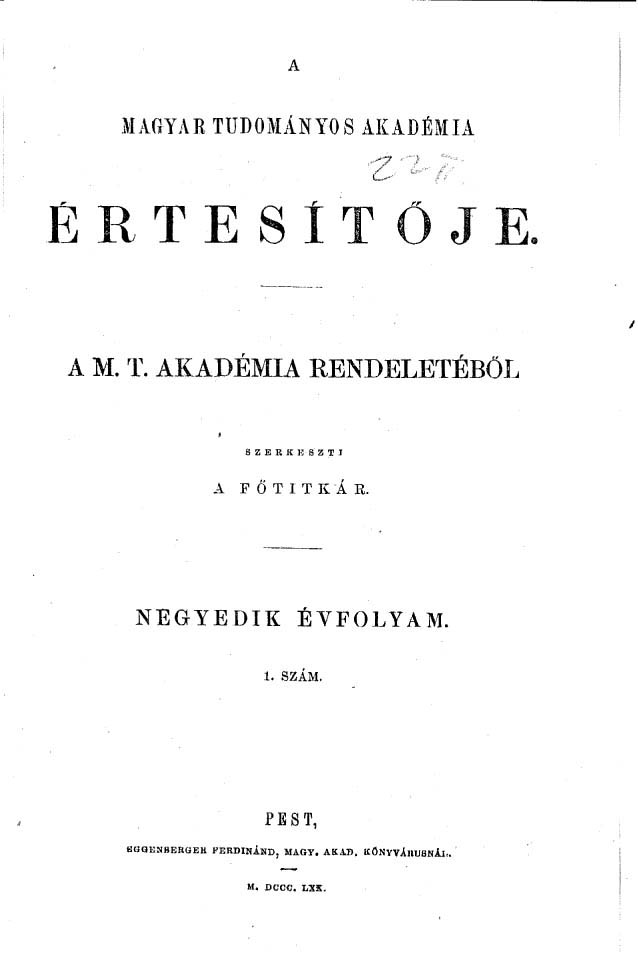 |
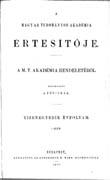 |
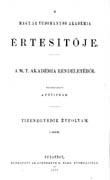 |
|||||
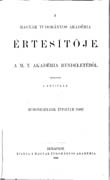 |
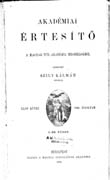 |
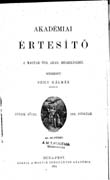 |
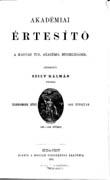 |
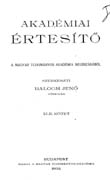 |